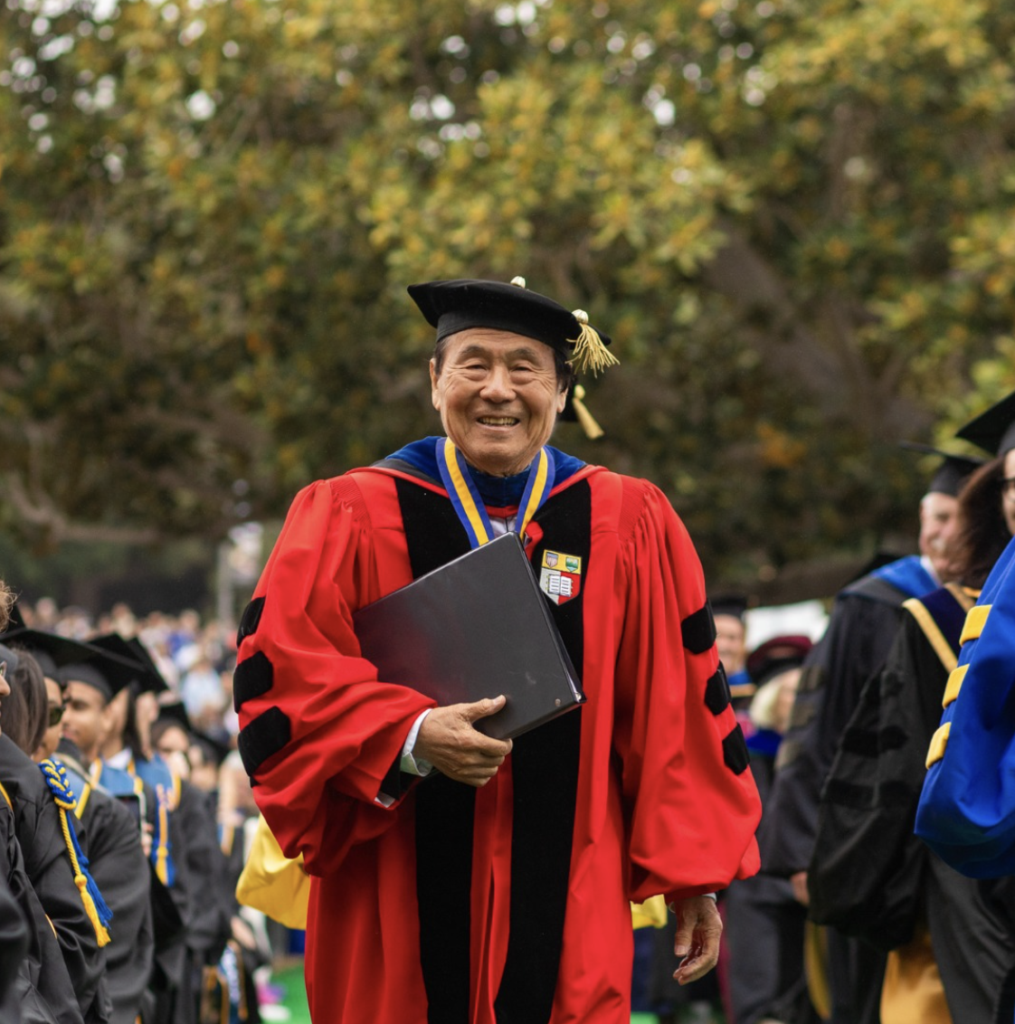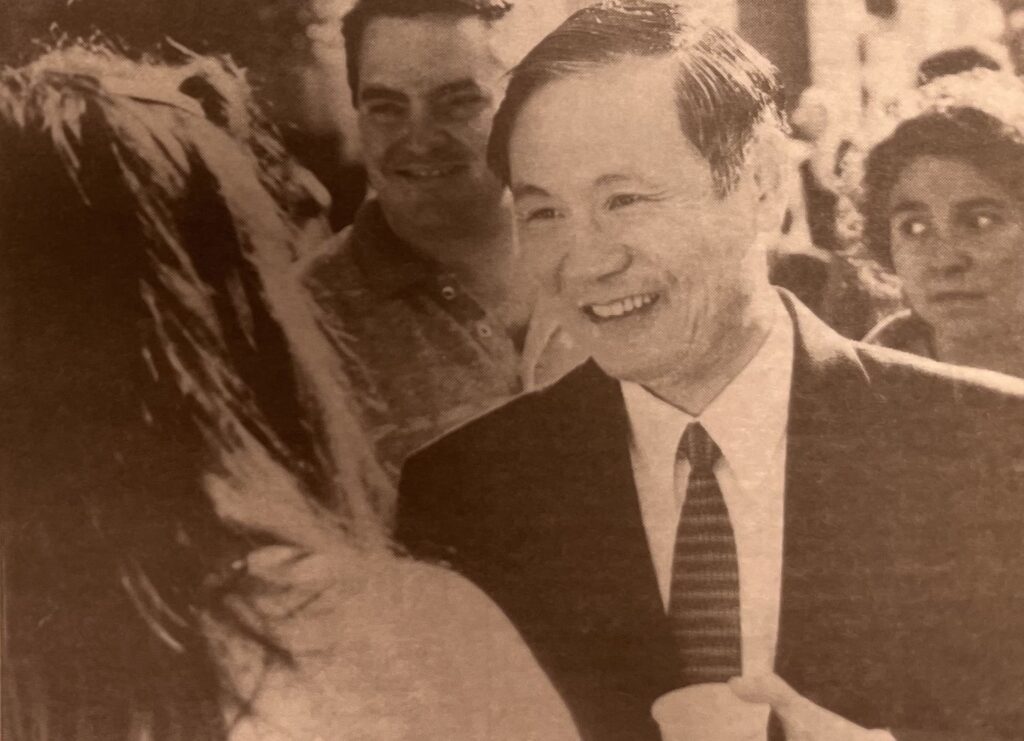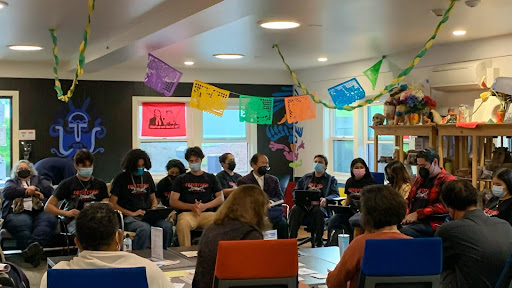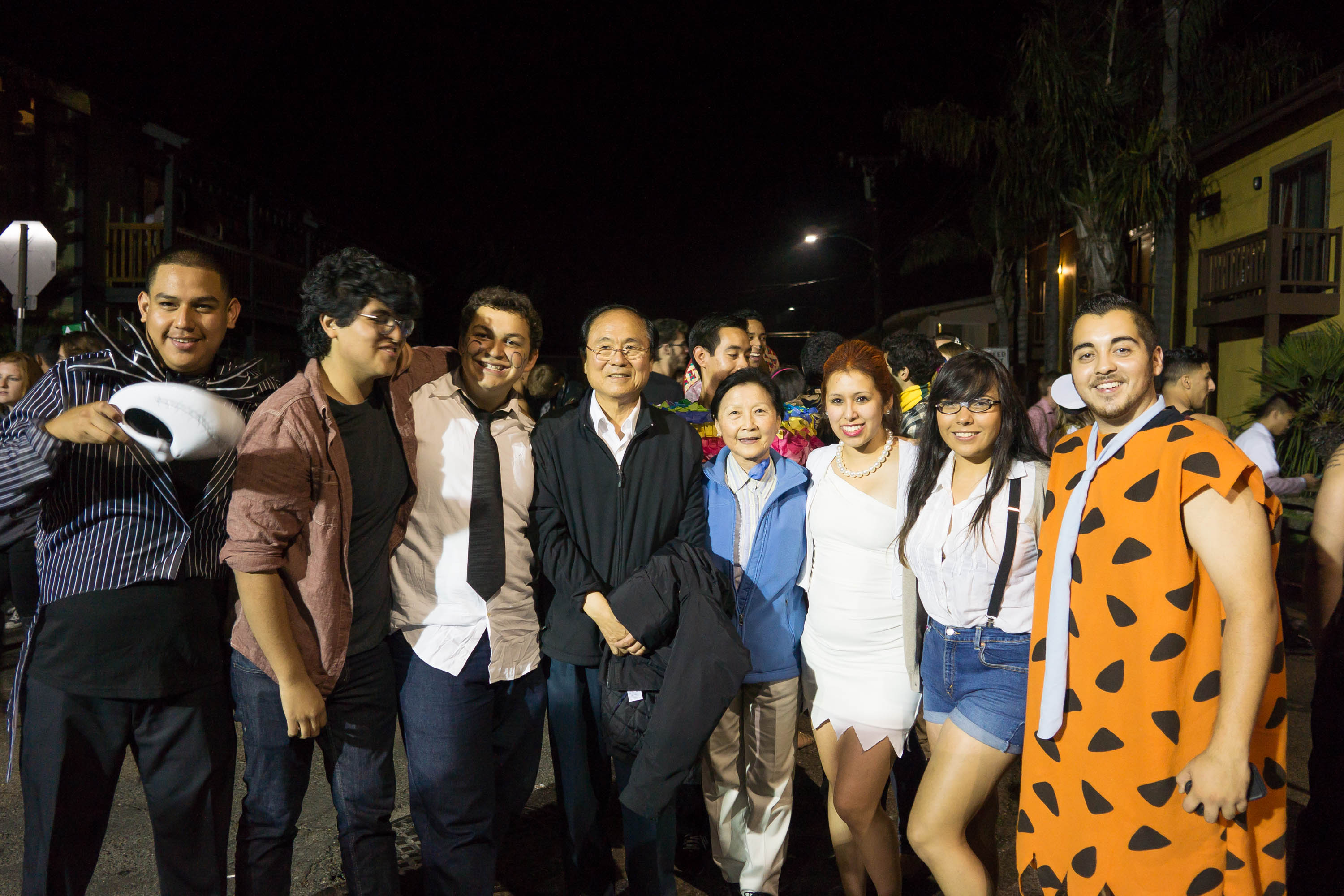CORRECTION [9/2/25, 11:43 a.m.]: A previous version of this article misspelled the name of Jeffrey Stewart. This article has been updated with the correct spelling.
Chancellor Henry T. Yang increased UC Santa Barbara’s research capabilities and selectivity throughout his term. Over 31 years, Yang handled various calls to action from students regarding social justice issues and living conditions with varying degrees of success.

Yang is the longest-serving UC Chancellor to date. Courtesy of UCSB
Background
Yang has had an extensive academic career, receiving a bachelor’s degree in civil engineering from the National Taiwan University, a master’s in structural engineering from West Virginia University and a doctorate in civil engineering from Cornell University. He taught at Purdue University for 25 years and became the dean of engineering and the Neil A. Armstrong Distinguished Professor of Aeronautics during his tenure.
In 1993, then-Chancellor Barbara Uehling resigned after seven years at the University. After a seven-month search, the UC Board of Regents approved Yang’s appointment as UCSB’s next chancellor in March 1994. Yang, alongside his wife, Dilling Yang, moved to the University House later that year.
“UCSB is an excellent university with a rich tradition of teaching, research and service,” Yang said in a university newsletter at the time. “It offers a new opportunity and a new challenge for me to make a contribution.”
Along with his announcement as chancellor, Yang stated he would continue teaching at UCSB. Throughout his term, he taught courses in the mechanical engineering department and guided several doctorates.
“Teaching is a cornerstone of research,” Yang said in a 1994 Daily Nexus article. “The role of a research institution [is] to build human resources through teaching and research.”
Research and early goals
Within the first 12 years of his term, Yang recruited several researchers to join the University. These professors included Finn Kydland, David Gross and Shuji Nakamura, among others. Five UCSB professors won the Nobel Prize from 1998 to 2004 in physics, chemistry and economics. In 2006, an article by the Wall Street Journal called UCSB a “rising star.”
“We hire these professors not because they can win Nobel Prizes, but because they are so talented. As president, I spend about 80% of my time talking with professors and students, listening to their ideas, and ensuring they enjoy their time at the university and work collaboratively. I do this every day, and I love it,” Yang told the Chinese Academy of Sciences (CAS) in 2008.

Yang during his first visit to UCSB in April 1994. Daily Nexus Archives
Jeffrey Stewart, the MacArthur Foundation Endowed Chair in Black Studies, highlighted the impact of Yang’s time as chancellor on the University’s research capabilities.
“Henry [Yang] stayed to build the foundation for a top S.T.E.M. university so deep into the hills of greater Santa Barbara that it could not easily be unearthed by the vagaries of time or national politics,” Stuart said. “Of course, today, it is not certain what is going to happen to any research university in the current national political climate. But Henry [Yang]’s example is a model for anyone who wants to make systemic change in an institution. Stay the course. Never abandon one’s dream.”
In the early days of his term, Yang also said he wanted to increase the number of freshman applicants. In 1994, about 17,000 freshmen applied to the University.
“This number is alarmingly low, as one of the key indicators of freshman quality is the number of students applying,” Yang said in the same CAS article.
Michael Miller, interim vice chancellor for student affairs and associate vice chancellor for student enrollment and success said in a statement to the Nexus that Yang’s core values of “striving for excellence” and “[improving] the diversity of our student body” impacted his work on the daily.
By 2007, roughly 41,000 freshmen applied. Through Yang’s initiatives and statewide growth, the number of applicants has risen significantly since then. Approximately 110,000 freshmen applied for fall 2024. The University has, in turn, become much more selective. While some see this as a rise in prestige, it can be argued that the aim of a state school should not be selectivity, but instead accessibility. This is a question that is raised across the entire UC system and is not exclusive to UCSB.
“The Chancellor approached me early in his career to say he wanted UCSB to be a leader in bringing more diversity to the campus. He pledged his commitment to support the Office of Admissions in this effort and encouraged us to think of creative approaches to reaching more families,” former Director of Admissions Lisa Przekop said in a statement to the Nexus. “He and Dilling often came to our recruitment events. There were literally times I just called and said, ‘We have a visiting group on campus today and if you happen to be free, we’d love you to come say hello for five minutes.’ And he came so many times, even on weekends and evenings.”
Yang’s relationship with Charles Munger
In 2010, the UC Regents voted to approve the Long Range Development Plan (LRDP), a contract that requires UCSB to build 1,800 more units of housing for faculty and staff. The contract also required the University to cap student enrollment at 25,000 until 2025. In order to stay in compliance with the contract, the University is building the Ocean Road Project for faculty and the East Campus Housing project for students.
In an interview with the Santa Barbara Independent, Yang talked about how he considers UCSB a “community-based institution” and the importance of contributing to the quality of life of the University.
“We contribute to the quality of life enjoyed by the residents of this region in many ways,” Yang said. “[The LRDP] is part of a collaborative project based on the shared vision of UCSB, the City of Goleta, Santa Barbara County, the Land Trust for Santa Barbara County, and other local conservation organizations to preserve more than 650 acres of coastal land and natural habitat for the enjoyment and appreciation of our community.”
However, the East Campus Housing project was not the original plan for student housing in the LRDP. The original plan was a complex known as Mesa Verde, which was abandoned in 2019. This led to the planning of Munger Hall; a controversial nine-story dormitory which planned to house 3,500 students. Notably, most bedrooms lacked windows.
The project was designed and primarily funded by Berkshire Hathaway Vice Chairman Charles Munger, who was expected to contribute hundreds of millions of dollars to fund the project. His first initial funding to UCSB was $65.4 million to build the Munger Physics Residence, which opened in 2017.
Yang was particularly appreciative of this donation, as it was the largest to ever be gifted to the University up until 2014, seemingly creating a working relationship between the two.
“Our campus is honored by the tremendous philanthropy of Charles Munger,” Yang said in an interview with the Current. “His gift has crowned the record number of donations made to our campus during the fiscal year.”
Yang continued to praise Munger for his donations to the campus and continued supporting his projects.
“We are most grateful to Charlie Munger for blessing our campus with a gift that will benefit our University for generations to come. This is much more than just a gift of land, but rather a living legacy, a vision for the long-range future of our campus,” Yang said in a 2018 statement.
Once Mesa Verde had been cancelled, Yang had begun plotting the 28-acre stretch of land currently housing the 2,700 beds at the Channel Islands 5 residence halls and the De La Guerra Dining Commons in order to build a new project titled “Donor Funded Student Housing.” This project was primarily being designed by Munger with the help of Yang, and was officially announced in July 2021.
The project led to mass criticism on a nation-wide level, leading Yang to create a review panel charged by the academic Senate to take public input for recommendations. This had led to various changes of the project, with the University eventually scrapping the project entirely in 2023.
Thirty Meter Telescope project
In 2007, Yang became the chairman of the Thirty Meter Telescope (TMT) project, which seeks to build a scientific telescope on Hawai‘i’s Big Island. This project has been long protested by students and activists, as it would be located on Mauna Kea, land sacred to Indigenous Hawaiians.
In an annual report on UC contributions to TMT obtained by the Nexus in 2022, the UC was required to contribute $107,223,485 from 2014 to 2024. These controversial contributions to the project led to petitions and open letters expressing opposition to Yang and UC as a whole, demanding open apologies and a permanent discontinuation of the project.
Through a California Public Records Act with the UC Office of the President filed by the Nexus on July 31, 2021, there was frequent communication with Yang and other TMT board members, many of whom are admin at different UC campuses. These emails highlighted a struggle for TMT to receive sufficient funding, specifically from the National Science Foundation (NSF), which has still not funded the project as of August 2025.
Not only have the emails obtained by the Nexus demonstrated clear financial and personal investment into TMT from Yang, it was also clear Yang had an understanding of the cultural weight the project held. In an email with a UCSB Foundation trustee, Yang wrote about Queen Lili‘uokalani, the last sovereign monarch of the Hawaiian Kingdom, and how “her experiences resonates with the betrayal felt by Native Hawaiians today,” but that they “must work through that for TMT to succeed.”
Becoming a Hispanic-Serving Institution
In 2015, UCSB was federally recognized as a Hispanic-Serving Institution (HSI). The designation is given to nonprofit universities with at least a 25% Latine undergraduate population. UCSB was the first university in the Association of American Universities to achieve this status and the third UC overall. As an HSI, UCSB faculty can apply for federal research grants and other initiatives that may benefit Latine students.
Activist student group El Congreso held a meeting with Yang in 2022 to discuss several demands, including transparency surrounding HSI funding and an HSI executive director. After the meeting, El Congreso received a list of faculty programs that have received funding through the University’s HSI designation, according to Chicana and Chicano studies professor and former department chair Gerardo Aldana. The University announced Veronica Lavenant Fematt as the first HSI director in 2024.
COVID-19 relief checks
During the COVID-19 pandemic, the UCSB student organization Young Democratic Socialists of America (YDSA) protested for the University to distribute $900 in COVID-19 relief checks to all students.
In 2020, UCSB received $25.2 million from the Coronavirus Aid, Relief, and Economic Security (C.A.R.E.S.) Act, 50% of which went to aid students. In 2021, the University received $38 million from Coronavirus Response and Relief Supplemental Appropriations Act (CRRSAA), of which over $12 million went directly to students.
YDSA believed that UCSB should have been distributing more of the COVID-19 relief funding to the student body. YDSA initially had petitioned for all students to receive $400 from the C.A.R.E.S. Act, which passed in March 2020. Since the additional funding, YDSA advocated for an additional $500 stimulus checks from the CRRSAA.
Yang never responded to YDSA, and no action was taken to provide students with the additional $500 in funding.
Hit-and-run
In May 2022, Yang was investigated by the California Highway Patrol (CHP) for allegedly hitting a student skateboarding through a campus crosswalk. CHP did not proceed with legal charges since they could not substantiate the cause of the collision nor the hit-and-run allegations.
The student, who suffered minor injuries, identified Yang as the driver. The investigation was originally handled by the UCSB Police Department, but then given to CHP due to a conflict of interest.
Yang’s name was redacted from the documents released for public record, but two law enforcement officials told the Los Angeles Times that he was the focus of the investigation and that his name was stricken from public record.
The student allegedly was struck by the front of the car and rolled over the hood, injuring his right hip and foot. He then got a clear look at the driver, with a woman in the passenger seat who he identified as Dilling Yang, until the car fled the scene.
UCSB had denied the allegations, citing the CHP report which said no physical damage was found on the chancellor’s car which would indicate a collision occurred. In Yang’s statement to the Los Angeles Times, he said he wanted to “respect the skateboarder’s report of what the skateboarder believed occurred,” leaving Yang’s involvement in the hit-and-run still a mystery to this day.
Palestine encampments
In May 2024, the autonomous pro-Palestine student group known as the Liberated Zone had set up encampments on the lawn between North Hall, also known as Malcolm X Hall, and the library in protest of the ongoing occupation of Palestine by Israel. Just a day after the encampment was mounted, Yang emailed the campus community in response.
The email read that, while the University was monitoring the situation carefully, the administration wanted to work with student groups who wished to protest, as long as they weren’t interfering with UCSB’s core educational research mission.
“We must ensure campus safety, and respect the right of everyone on campus to feel safe. Those violating laws and codes of conduct in unsanctioned, illegal, and disruptive activities, whether non-affiliates or members of our campus community, are subject to legal and disciplinary action,” the email read.
Yang also expressed worry that the encampments would’ve affected the upcoming commencement ceremony, arguing that many students who were graduating were already deprived of a high school graduation due to the COVID-19 pandemic.
“We owe it to them to allow them to complete their studies in an environment that supports teaching and learning,” the email read.
Faculty reaction
Reflecting on Yang’s time as chancellor, several faculty members highlighted his communication and said he frequently consulted others.
“He consults, then he consults, and then he consults some more. He’s very cautious in coming to a decision. He makes sure he talks to everyone, and usually twice. Not everyone appreciated his process, but he lasted 31 years because he consulted a lot, and he was deliberate in making decisions. That was a strength,” Former Executive Vice Chancellor and Professor Emeritus of Chemical Engineering Gene Lucas said in a statement to the Nexus.
“Faculty could call him, or send a text, and he would always respond, sometimes within the hour. He knows so many of us — not only our academic interests but when we arrived at UC Santa Barbara, what we care most about and what challenges we’ve faced,” Susannah Scott, distinguished professor of chemistry and chemical engineering and former chair of the academic Senate said in a statement.
Physics professor and former Vice Chancellor for Research, Joe Incandela, said in a statement that Yang’s greatest strength is “to know people and understand what matters to them.”
Transition to a new chancellor
In August 2024, Yang announced he would be stepping down from his role as chancellor at the end of the 2024-25 academic year. In his statement, he expressed appreciation for the UCSB community and was enthusiastic to continue working as a professor in the College of Engineering.
“I look forward to returning to the classroom and lab after this academic year, and continuing to support our unparalleled community of students, faculty, and staff to the best of my abilities,” Yang said.
During his last year as chancellor, Yang was awarded the UC Presidential Medal in recognition of his “tremendous impact on the growth and stature of the campus he has led for three decades.”
El Congreso had sent a letter to Yang in 2022 with a list of demands, including the dissolution of Munger Hall and an expansion of El Centro, which have since been met.

Members of El Congreso and Yang met to discuss the organization’s demands in 2022. Nexus File Photo
However, after the announcement of Yang’s retirement, El Congreso drafted a new letter in May calling for him to meet demands that have not yet been met related to the HSI director, housing contracts and the Comunidad Latinx Graduación (CLG). Yang has not addressed the demands of El Congreso since the updated letter was released.
Yang officially stepped down on July 15, with Executive Vice Chancellor David Marshall becoming the interim chancellor in the meantime. On July 17, it was announced that the former president of the University of Delaware, Dennis Assanis, was appointed the sixth chancellor of UCSB, assuming the role on Sept. 1.
In a statement emailed to the Nexus, Yang reflected on his 31 years as chancellor.
“Serving as the Chancellor of UC Santa Barbara has been the highest honor of my career. I am deeply grateful to our faculty, staff, students, alumni, trustees, and friends for their unwavering support and shared commitment,” the statement read. “Together, we have built a world-class institution. Dilling and I are excited for this next chapter of continued service to our beloved university, through research, teaching, and other projects. UC Santa Barbara will always have my heart, and I remain committed to supporting our unparalleled community in every way I can.”

Yang and his wife, Dilling, during their once-annual tradition of walking the streets of I.V. on Halloween weekend in 2013. Nexus File Photo





















Why did they let white male replace him? Isn’t that oppressing the UCSB students according to democrat beliefs?
I ❤️ jack dindia
We must stand up and applod the regents for appointing a man of color—a chinaman—to couragasely beat back the rebublitard forces all these years who would have made watching FoxNews required curricalam. Oh how I despise these MAGA rednecks who are morrons and our constantly messing with are education system
I learned about the September 11, 2001 attacks while waiting for a red light at the intersection of Hollister and Fairview while listening to the Michael Reagan show on the radio as I drove to work at UCSB late that morning. When I arrived at UCSB, I was surprised to learn that the school was still open. My thinking was that the country was under attack and nobody yet knew the extent of the plot and there was a real possibility that West Coast targets had yet to be hit. With six Nobel Prize winners, UCSB could be an attractive… Read more »
Did Yang arrest you?
you are a horrible person. Please leave campus alone you have terrorized us enough
You two should get a room.
Why are you posting here? you failed out and couldnt make it here. Yet you continue to harass and follow our newspaper and campus goings ons. Its a weird stalker incel vibes. Move on with your life.
I’m here to find truth. Your version of the story about Neil sounds fishy to me. Your opinion of Neil comes from a place of hate and insecurity. You’re entitled to your version of the events involving Neil, but I’m sure that’s not the way Neil remembers it.
You are crazy and stupid its a bad way to go thru life.Neil was in a mental hospital so his memory of the events should be suspect but you the idiot say there might be something here to listen to the felonious criminal who is mentally unstable.
Yes i remember the reality of it and he had a delusional false take on it
You’re the type of psycho who laughed at Charlie Kirk dying. Look in the mirror if you want to see a psycho.
So stupid wheres your uc degree?
I don’t get degrees from universities that indoctrinate psychopaths.
BC you failed out.
I know some of you readers are probably asking what Federal laws UCSB Mafia broke when I worked for them and blew the whistle on them. You should want to know the answer. I first noticed it when they hired me because in the course of my year 2000 interview with UCSB, they admitted that they had contacted past supervisors of mine that I hadn’t listed as references. It wasn’t detrimental to me because the people they contacted gave me good recommendations but it was a violation of Federal Law. I let them know during the interview that it was… Read more »
You should write a book and sell it on Amazon.
You two should get a room. With rubber walls and nice people to take care of you both at the institution.
None of that long delusional lie is true. it is frightening
Why wont you just leave UCSB alone? you have terrorized campus enough
Rubber rooms are for psychos online such as you that like people such as Charlie Kirk being murdered.
Are the voices in your head telling you that? BC i never said that again its your delusion that you think is reality.. No wonder you couldnt graduate from here. Everyone of your posts is dumber than the last
Don’t do any violence, but seek help instead of going on a rampage on MAGA for your furrie roommate.
Again you bable random thought you need a psych eval just like Neil. What an Incel
Only an idiot uses the word ‘incel’ because all men have desired sex and not been able to get it.
the response of an incel. this makes alot of sense. hahahaha
The response of a libtard that has an IQ of 80.
Please post your UC degree since you couldnt make it here you have no right to say any thing stupid.
Incel loser behavior every post
Neil Baker Please cancel Santa Barbara NEIL BAKER To: webmaster@paulmccartney.com · Wed, Sep 17 at 10:56 AM First, I’m no expert but my analysis of the venue at Santa Barbara Bowl clearly indicates that it’s not safe. Considering the recent assassination of Charlie Kirk and near assassinations of Donald Trump at outdoor venues indicates that such venues are especially difficult to secure and possibly obsolete. I don’t know who you have doing security for Paul McCartney but you may want to consider replacing them as it is inexcusable to have blundered so badly as to accept Santa Barbara Bowl as a venue.… Read more »